This article was co-authored by Lora Luczywo, IBCLC. Lora Luczywo is an International board certified Lactation Consultant (IBCLC) based in Los Angeles, California. Lora has over 10 years of lactation consulting experience. She completed her lactation education at the University of California, San Diego and earned her clinical competency at Kaiser Permanente Los Angeles Medical Center and Torrance Memorial Medical Center. She has a BA in Liberal Arts and Sciences from the University of Arizona.
There are 10 references cited in this article, which can be found at the bottom of the page.
This article has been viewed 111,582 times.
If you are underweight, breastfeeding can be difficult on your body, so of course, you want to do everything you can to stay healthy for you and your baby! A doctor can help you determine whether you need to gain weight while breastfeeding, and then, you can determine how much more you need to eat to gain weight. Start by adding calories to things you already eat and also work on eating more often and making your meals more caloric.
Steps
Calculating How Many Calories You Need
-
1Talk to a doctor or nutritionist about your nutrition needs. If you haven't already, discuss the issue with your doctor. It may be that you don't need to gain weight. If you do, your doctor can help you estimate how many calories you need, as well as help you make a plan to increase your calories in a way that's healthy for you and your baby.[1]
- Your doctor may also recommend you see a nutritionist, who can provide you with one-on-one help to make a dietary plan.
-
2Determine your caloric needs while breastfeeding. These calculators use factors like your weight and height to help determine how many calories you need. Since you're breastfeeding, use one that factors that in, as you need more calories. Try the one from the U.S. Government at https://www.choosemyplate.gov/MyPlatePlan.
- This particular calculator tells you how many calories per day you need to maintain your weight.
- Be sure to mark that you're breastfeeding.
EXPERT TIPLora Luczywo is an International board certified Lactation Consultant (IBCLC) based in Los Angeles, California. Lora has over 10 years of lactation consulting experience. She completed her lactation education at the University of California, San Diego and earned her clinical competency at Kaiser Permanente Los Angeles Medical Center and Torrance Memorial Medical Center. She has a BA in Liberal Arts and Sciences from the University of Arizona.International Board Certified Lactation Consultant
 Lora Luczywo, IBCLC
Lora Luczywo, IBCLC
International Board Certified Lactation ConsultantOur Expert Agrees: To have a healthy diet while you breastfeed, focus on eating things like lean proteins and vegetables. It's probably fine to eat any of the foods that you ate while you were pregnant, but you should add in about 500 extra calories a day. Also, make sure to stay well-hydrated.
Advertisement -
3Keep a food journal to estimate how many calories you're eating. To gain a pound, you need to eat 3,500 calories more than you're burning. That can be over any period of time, such as a week or a month. A food journal can help you estimate how many calories you're consuming each day.[2]
- Write down the foods you eat for breakfast, lunch, dinner, and snacks. Add up the number of calories you're eating. You can use this chart to help you out: https://www.cdc.gov/healthyweight/pdf/food_diary_cdc.pdf.
- If you're not used to counting calories, you may need to measure your foods to accurately represent what you're eating. For instance, you may not be able to visually estimate what a serving of pasta looks like.
- Use online calorie counters to help you estimate you're servings. You can also use apps to help you count calories.
-
4Compare your caloric intake with the calories you need to maintain your weight. You need to be taking in more calories per day than what you need to maintain your weight. Take the number you got from what you're eating, and see if it is equal to, less than, or more than that number.[3]
- So if the calculator tells you need 2200 calories to maintain your weight as a breastfeeding mother, you'll need to take in 2300-2400 calories a day at least to gain weight. To gain a pound a week, you'd need to take in an extra 500 calories a day.
Adding More Calories to What You Already Eat
-
1Sprinkle cheese on your food for calories and calcium. Try a sprinkling of shredded cheddar cheese on a casserole or a handful in your eggs. Toss some feta cheese in your salad, or add some Parmesan on top of your pasta. Since cheese is high in calories, it increases your caloric intake effortlessly. Plus, your baby will appreciate the extra calcium.[4]
-
2Include healthy fats when you can for your baby's brain health. Healthy fats include fatty fish, nuts, avocados, olives, and certain vegetable oils, such as corn oil, olive oil, peanut oil, and safflower oil. To easily increase calories, add more of these to your meals, such as eating more salad dressing on your salad or adding more mayonnaise to your sandwich.[5]
- You can also sprinkle nuts on your salad, or sneak avocados into your enchiladas.
- Eating extra fatty fish is great for your baby's health. However, skip fish that are high in mercury. Good fish options include canned light tuna, trout, tilapia, cod, herring, catfish, shrimp, shad, salmon, and herring.
- You can eat certain fish in moderation. Stick to a single serving a week, and don't eat any other fish that week. These fish include yellowfin tuna, albacore tuna, grouper, halibut, snapper, mahi-mahi, snapper, and Chilean sea bass.
- Fish high in mercury include king mackerel, shark, swordfish, orange roughy, and bigeye tuna.[6]
-
3Mix fat-free milk powder into soup. Milk powder is a lean protein that can add some extra calories. Plus, it will give your baby a calcium boost. You likely won't even notice it in your soup, except it may be a bit creamier.
- You could also add a dash to mashed potatoes or casseroles.
-
4Put honey and jam on toast. Honey and jam are relatively healthy sugary toppings, and they are calorie dense. Add them to your foods when you can for an extra boost of calories.
- You can also add a dollop of jam and/or honey to your oatmeal, or mix some honey into your morning tea or coffee.
Eating More Calories Overall
-
1Use your breastfeeding time to remind yourself to eat. Your baby will be eating small meals throughout the day so try eating after you feed. If you're having trouble gaining weight, it may be because you get full quickly. Eating more often can take care of that problem, as even if you only eat a small amount, it will add up throughout the day.[7]
- Aim for 5-6 small meals each day.
- A small meal could be 2 eggs and whole wheat toast, a ham sandwich, or a small can of soup, for instance.
-
2Wait to drink fluids with your meal or after it. If you drink water right before your meal, it can make you feel full. Instead, consume drinks with your meal, or if that still makes you full, wait 30 minutes after you're done eating.[8]
- Pick high-calorie beverages like milk, juice, or even a smoothie.
-
3Choose nutrient-dense foods that are high in calories. If you get full quickly, eating foods that are high in calories (but still nutritious) can help you gain weight. Try foods like dried fruit, heavy whole-grain breads, and bean and meat stews. These foods will add calories, but still give you and your baby the nutrition you need.[9]
- Dried fruit is a good option because it condenses the calories of the fruit into a much smaller package so you don't feel as full when eating it.
- You can also try nuts and seeds and lean proteins.
-
4Down a smoothie or protein shake when you don't feel like eating. If you need to eat but nothing sounds good, a smoothie may be a good option. That way, you get in some calories, but you aren't forcing yourself to eat. Plus, smoothies give you an extra boost of vitamins and minerals, great for you and your baby.[10]
- You can buy pre-made smoothies or make your own.
- Add some protein and calorie-dense foods to your smoothie, such as yogurt, peanut butter, milk, almond butter, or protein powder.
- You can also try meal-replacement protein shakes. Keep them on hand, then down them as needed.
Sample Three Day Meal Plan
References
- ↑ https://www.nhs.uk/live-well/healthy-weight/managing-your-weight/advice-for-underweight-adults/
- ↑ https://www.cdc.gov/healthyweight/calories/index.html
- ↑ https://www.healthnavigator.org.nz/healthy-living/w/weight-tips-to-gain/
- ↑ https://my.clevelandclinic.org/health/articles/16555-snack-ideas-for-weight-gain
- ↑ https://www.eatright.org/health/wellness/your-overall-health/healthy-weight-gain
- ↑ https://www.fda.gov/food/consumers/advice-about-eating-fish
- ↑ https://familydoctor.org/healthy-ways-to-gain-weight-if-youre-underweight/
- ↑ https://www.eatright.org/health/wellness/your-overall-health/healthy-weight-gain
- ↑ https://familydoctor.org/healthy-ways-to-gain-weight-if-youre-underweight/
About This Article
If you’re underweight, breastfeeding can be hard on your body, so try gaining weight to help keep yourself and your baby as healthy as possible. To add more calories and calcium to what you already eat, sprinkle some cheese on your food. You can also include healthy fats in your meals, like fatty fish, nuts, avocados, olives, and vegetable oils, which are also good for your baby’s brain development. If you find that you get too full quickly, try eating several small meals throughout the day, or every time your baby nurses. Another way to add more calories to your diet is to drink a smoothie or protein shake when you don’t feel like eating. Add some protein and calorie-dense foods to your shakes, like yogurt, peanut butter, milk, or protein powder. To learn how to figure out how many calories you need when you’re nursing, keep reading.
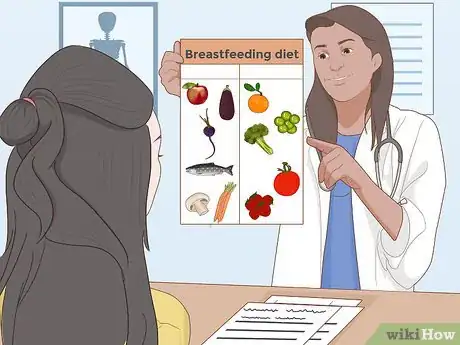
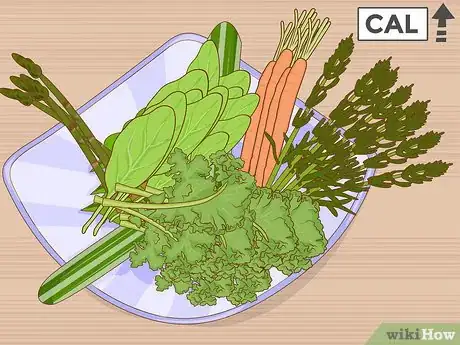
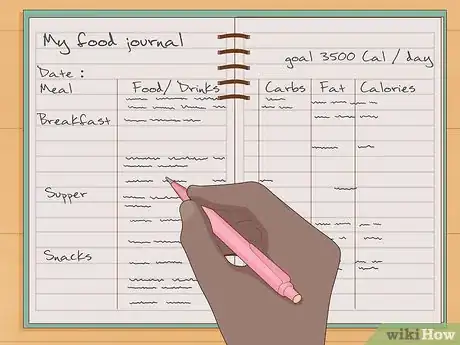
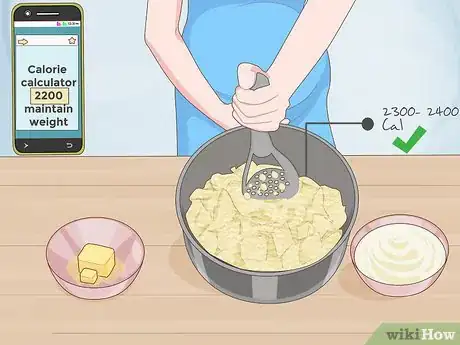
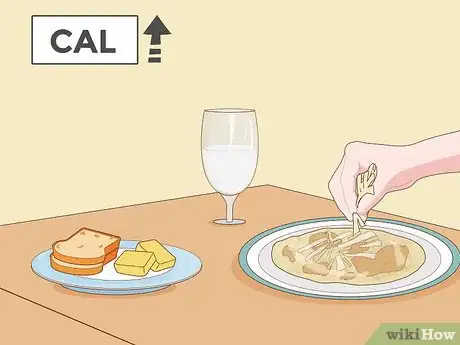
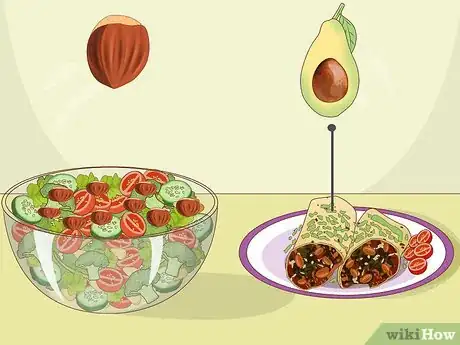
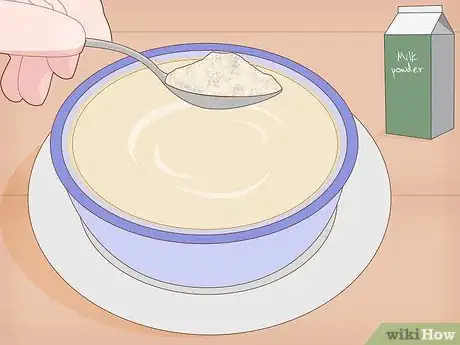
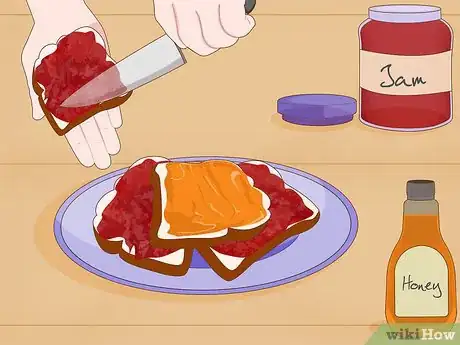
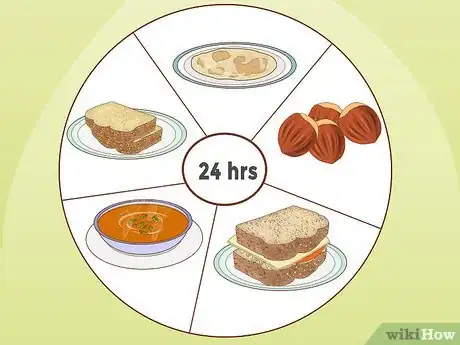
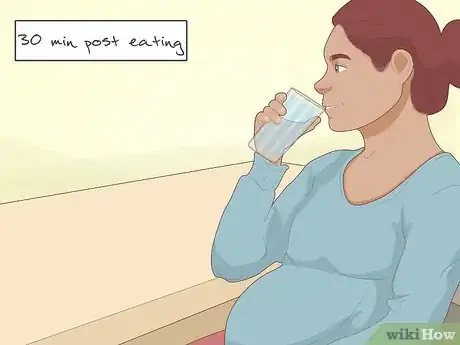
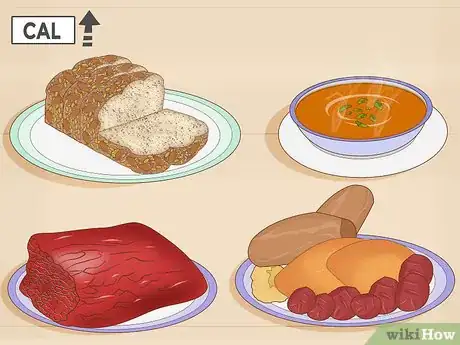







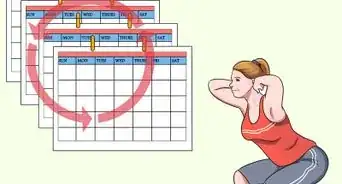






















































Medical Disclaimer
The content of this article is not intended to be a substitute for professional medical advice, examination, diagnosis, or treatment. You should always contact your doctor or other qualified healthcare professional before starting, changing, or stopping any kind of health treatment.
Read More...